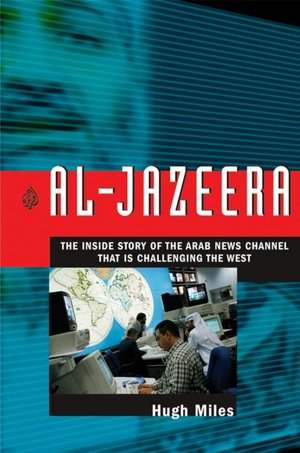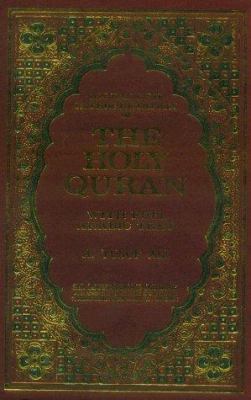Holy crap, this was a good read. Found it hard to put it down, which is not what I expected of a 400-page book on new media in the Middle East.
Representative quote: Since then [i.e. the invasion of Afganistan] it has often been glibly stated that Al-Jazeera and the rest of the Arab media is shaping Arab public opinion towards the West for the first time. But Arabs have already been mulling over the pros and cons of democracy for almost two hundred years: what is meant is that today Arab public opinion matters for the first time.
Next book: "Voices: An Annotated Anthology of Contemporary Bahraini Poetry", edited by Marhamah Hasan Marhamah.
Truth is, I wasn't sure if I'd pick it up at first, given that it's published in 2005, a year before Al-Jazeera English was launched - behind the times, much? But the alternatives didn't seem quite good enough - Josh Rushing's Mission Al-Jazeera talks about life as a reporter for the English channel but only after a huge blather about his life as a good ol' American Marine (also, the huge font looked insulting) while Philip Selb's The Al-Jazeera Effect seemed a wee bit too academic (I'm an intellectual snob, but I also read for fun, darling).
Can't say the cover attracted me much:

But the story - oh, what a story. First, the setup: Qatar is a tiny country with a citizen population of less than 300,000 people (Emiratis joke that they could fit all of them into one of their hotels). Their brand of Islam is Wahhabi, their system of government is near-absolute monarchy and their royal family was known as the "thugs" of the Gulf, due to their often violent successions. This hasn't improved much in recent history: the regnant Sheikh Hamad deposed his father while the latter was on holiday. (It's said that he collapsed in a fit of laughter when, as a young man in the UK, he first learned the concept of democracy.)
Pretty stereotypically backward Arab state, hein? But as soon as Hamad took power in '95, he abolished the Ministry of Information (which in fact was the Ministry of Censorship) and enshrined freedom of the press into the Constitution. Unheard of among Arab states. Then he used his vast fortune to found Al-Jazeera, drawing an international pool of foreign-educated Arab reporters to Doha, impressing upon them his guarantee of a truly modern Arabic news station.
Seems that back then, Arabic news was in the Jurassic age: newsreaders merely read out press releases from the Ministries and the social lives of the Mubaraks: Al-Jazeera drew people in with real investigative journalism, real debates between antagonistic opinions on The Opposite Direction, surprisingly liberal fatwas on Shariah and Life, and eventually the in-depth coverage of the Second Intifada and the US invasion of Afghanistan (especially in-depth in the latter case since Al-Jazeera was the only news station with reporters actually inside the country). Satellite transmission was free, sustained not by advertising but by the Sheikh's payouts, so that even the poorest Arab speakers could tune in - today, Miles tells us, nomadic Bedouin weddings no longer involve a dowry of jewellery, but the gift of a satellite dish instead, so that the newlywed couple can watch the news together.

But the story - oh, what a story. First, the setup: Qatar is a tiny country with a citizen population of less than 300,000 people (Emiratis joke that they could fit all of them into one of their hotels). Their brand of Islam is Wahhabi, their system of government is near-absolute monarchy and their royal family was known as the "thugs" of the Gulf, due to their often violent successions. This hasn't improved much in recent history: the regnant Sheikh Hamad deposed his father while the latter was on holiday. (It's said that he collapsed in a fit of laughter when, as a young man in the UK, he first learned the concept of democracy.)
Pretty stereotypically backward Arab state, hein? But as soon as Hamad took power in '95, he abolished the Ministry of Information (which in fact was the Ministry of Censorship) and enshrined freedom of the press into the Constitution. Unheard of among Arab states. Then he used his vast fortune to found Al-Jazeera, drawing an international pool of foreign-educated Arab reporters to Doha, impressing upon them his guarantee of a truly modern Arabic news station.
Seems that back then, Arabic news was in the Jurassic age: newsreaders merely read out press releases from the Ministries and the social lives of the Mubaraks: Al-Jazeera drew people in with real investigative journalism, real debates between antagonistic opinions on The Opposite Direction, surprisingly liberal fatwas on Shariah and Life, and eventually the in-depth coverage of the Second Intifada and the US invasion of Afghanistan (especially in-depth in the latter case since Al-Jazeera was the only news station with reporters actually inside the country). Satellite transmission was free, sustained not by advertising but by the Sheikh's payouts, so that even the poorest Arab speakers could tune in - today, Miles tells us, nomadic Bedouin weddings no longer involve a dowry of jewellery, but the gift of a satellite dish instead, so that the newlywed couple can watch the news together.
And let's face it: this is a story with heroes and villains. Plucky little Al-Jazeera, its office compared to a matchbox by an incredulous Mubarak, has managed to deliver some of the most balanced news reportage in the world despite constant abuse and threats from Saudi Arabia, from Kuwait, from Jordan, from the USA and the UK. (The stories of how reporters and cameramen were arrested, abused, tortured, even strategically murdered by Coalition forces with no investigations following, are quite horrifying.)
Of course, hardly anyone believes it's balanced: in the Middle East there are so many agendas that any attempt to tell both sides of the story (it was the first Arab station to actually show Israelis speaking on the air!) is doomed to misunderstanding. It's been called pro-Israeli, pro-Hamas, pro-America, pro-Al Qaeda... pro-Qatari of course, but Miles assures us that the station openly criticises the government's policies, especially the fact that it houses the American air base from which the Coalition conducted the invasion of Iraq.
It's a fascinating story - more intriguing, I'd argue, than what's happened in Dubai, because it's about the explosion of information, not wealth; it's about rising up for free speech at the same time as America's clamped down on its objective reporting. It's about a transformation of consciousness, and it started from a tiny irrelevant country which only got rich in the '90s, after people figured out how to extract its natural gas reserves. (Not sure if it can be argued that it engendered the Arab Spring, though. Probably not.)
Also of interest are the tidbits about Qatari society: how the people have been given hefty payouts and sinecures and are so wealthy they can retire in their thirties; how they've been pushed by the Sheikh to liberalise, sending their kids abroad to study and get their minds blown by Western democracy; how the Sheikh's second wife has become a spokesperson in her own right for children's rights, a phenomenon almost unknown in the Arab world.
Yep, there's some benefits to reading stuff by foreigners. Would a Qatari have fessed up to all these obvious details? Not so sure.
Representative quote: Since then [i.e. the invasion of Afganistan] it has often been glibly stated that Al-Jazeera and the rest of the Arab media is shaping Arab public opinion towards the West for the first time. But Arabs have already been mulling over the pros and cons of democracy for almost two hundred years: what is meant is that today Arab public opinion matters for the first time.
Next book: "Voices: An Annotated Anthology of Contemporary Bahraini Poetry", edited by Marhamah Hasan Marhamah.






